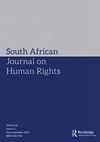Ending Childhood Obesity: A Challenge at the Crossroads of International Economic and Human Rights Law
IF 0.6
4区 社会学
Q3 LAW
引用次数: 3
Abstract
This book is an important read for anyone interested in child rights and child health. It will prove useful for researchers and litigators alike. It explains in detail how childhood obesity cannot be classified simply as the result of poor eating habits – obesity stems from harmful commercial practices that leave children and their families with few alternatives. Importantly, the book illustrates how the tools of international human rights law can be used to end childhood obesity. The book stems from the work of the Law and Non-Communicable Diseases (NCD) Research Unit and its global partners at the University of Liverpool. The editors – Amandine Garde, Joshua Curtis (both at the University of Liverpool) and Olivier De Schutter (Catholic University of Louvain) – are experts in global health law, international economic law and international human rights law respectively. Notably, Schutter was the United Nations Special Rapporteur on the Right to Food and is the current Special Rapporteur on Extreme Poverty and Human Rights. The book follows the United Nations High Level meeting on NCDs in 2017 (WHO Montevideo Road Map 2018–2030 on NCDs as a Sustainable Development Priority) and the commitment made to take action to reduce by a third premature mortality caused by NCDs. Other relevant soft law instruments (such as the World Health Organisation (WHO) Global Action Plan for the Prevention and Control of Non-communicable Diseases 2013–2030) urge States to provide more information to consumers to enable healthy food choices and calls for measures to address the food environment to ensure the availability, accessibility and affordability of healthier food. Ending Childhood Obesity is an important contribution on the intersecting relationships between children’s rights, international economic law and global health law. One does not need to have expertise in all (or any) of these areas to understand the general premise of the arguments made. The book is easy to read and is written for a non-scientific audience. While the researchers are based in the Global North and write from such perspective, the book resonates with the complexities and challenges posed by childhood obesity in the Global South. Indeed, childhood obesity is on the rise in developing states, existing uncomfortably alongside childhood undernutrition. In this way, childhood obesity creates a double malnutrition burden on developing countries. South Africa is no exception. A recent report indicates that stunting (an indication of chronic undernutrition) is ‘exceptionally high’ in South Africa, while childhood obesity is causing a national increase in NCDs. The statistics are stark – one in four children under the age of five in South Africa are stunted, and终结儿童肥胖:国际经济和人权法十字路口的挑战
对于任何对儿童权利和儿童健康感兴趣的人来说,这本书都是一本重要的读物。事实证明,它对研究人员和诉讼律师都很有用。它详细解释了儿童肥胖不能简单地归类为不良饮食习惯的结果——肥胖源于有害的商业行为,使儿童及其家庭几乎没有其他选择。重要的是,这本书阐述了如何利用国际人权法的工具来结束儿童肥胖。这本书源于利物浦大学法律与非传染性疾病研究所及其全球合作伙伴的工作。编辑Amandine Garde、Joshua Curtis(均在利物浦大学)和Olivier De Schutter(天主教卢旺大学)分别是全球卫生法、国际经济法和国际人权法专家。值得注意的是,舒特曾任联合国食物权问题特别报告员,现任赤贫与人权问题特别报告官。本书介绍了2017年联合国非传染性疾病高级别会议(世界卫生组织蒙得维的亚路线图2018-2030关于非传染性疾病作为可持续发展优先事项)以及采取行动将非传染性疾病导致的过早死亡率降低三分之一的承诺。其他相关软性法律文书(如世界卫生组织(世界卫生组织)《2013-2030年预防和控制非传染性疾病全球行动计划》)敦促各国向消费者提供更多信息,使其能够选择健康的食品,并呼吁采取措施解决食品环境问题,确保更健康的食品的供应、可及性和可负担性。终止儿童肥胖是对儿童权利、国际经济法和全球卫生法之间交叉关系的重要贡献。一个人不需要在所有(或任何)这些领域都有专业知识就可以理解所提出论点的一般前提。这本书很容易阅读,而且是为非科学读者而写的。虽然研究人员驻扎在全球北方,从这样的角度写作,但这本书与全球南方儿童肥胖带来的复杂性和挑战产生了共鸣。事实上,儿童肥胖在发展中国家呈上升趋势,与儿童营养不良同时存在,令人不安。通过这种方式,儿童肥胖给发展中国家造成了双重营养不良负担。南非也不例外。最近的一份报告表明,发育迟缓(慢性营养不良的一种迹象)在南非“异常严重”,而儿童肥胖正在导致全国非传染性疾病的增加。统计数据十分严峻——南非五岁以下的儿童中,四分之一发育迟缓
本文章由计算机程序翻译,如有差异,请以英文原文为准。
求助全文
约1分钟内获得全文
求助全文

 求助内容:
求助内容: 应助结果提醒方式:
应助结果提醒方式:


